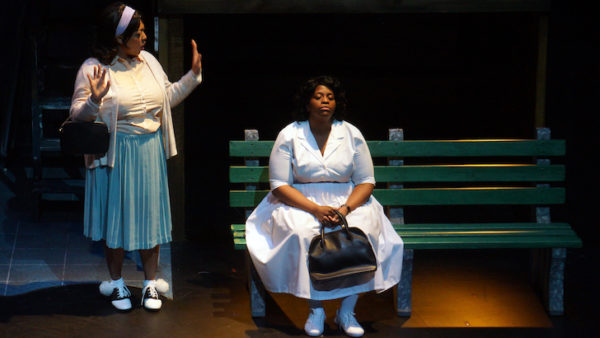Theater Review: “Caroline, or Change” — In Purgatory, All Souls Are Tested
By Greg Harris
This evening is a revelatory experience on race relations, with grief, rage, and the whole business of hope and change.
Caroline, or Change. Book and Lyrics by Tony Kushner. Score by Jeanine Tesori. Directed by Allison Olivia Choat. Staged by Moonbox Productions at the Boston Center for the Arts, 527 Tremont Street, Boston, MA, through May 11.

Lyndsay Allyn Cox and Yewande Odetoyinbo the Moonbox Productions Photo: Sharman Altshuler.
Heat gathers through the first act of Caroline, or Change: the sweltering vapors of Lake Charles, Louisiana, a swamp where, as the opening song proclaims, “there ain’t no underground,” only “underwater.”
One house has a basement, though, and Caroline Thibodeaux, black maid to the Jewish Gellman family, is stuck in it doing laundry. A purgatory, a space of near-solitary confinement, the basement has its temperature raised still higher by the electric dryer. At one point, Caroline (played with authenticity and verve by Yewande Odetoyinbo) declares to Noah, the Gellmans’ young son, that everything in the world is created by God except the dryer—which is the devil’s.
All this heat, and the electrostatically charged atmosphere of 1963, with the president killed in Dallas and Martin Luther King, Jr. bidding Southern black citizens rise, culminates in an Act II confrontation with her fate to which Caroline brings the existential wail of the Book of Job. Fate responds with all the intensity of a lightning strike.
So blinding was that moment (one woman sitting near me burst forth in involuntary sobs, and I had to blink my eyes to clear them), so high the degree of artistry focused by the exceptional cast, so affecting the spare but expressive set of tortured wood exploding from beneath a middle-class home, so expressive the book by Tony Kushner and the music of Jeanine Tesori, that for hours after the show my mind registered only the intensity and purity of one of the most moving experiences I’ve ever had in a theater.
Later, like a Polaroid developing post-flash, memory painted in more details, and flaws in the script became more evident. It’s hard to fully accept the artifice of having personified appliances represent Caroline’s inner life, despite strong vocal performances by Davron S. Monroe as the devilish dryer, Pier Lamia Porter as the washing machine, and a Shondelles-style close-harmony group of Maria Hendricks, Aliyah Harris, and Lovely Hoffman representing a radio.
Surprisingly, too, since Kushner’s story is in part based on his own upbringing in Lake Charles, the Jewish family here feels sketched in. We’re told about, more than we see, the sadness that’s crippling Noah Gellman (played by Ben Choi-Harris) and his clarinet-playing father (Robert Orzalli); schematic, too, is the outsiderness of New York stepmother Rose Stopnick Gellman (Sarah Kornfeld). The key plot mechanism, the game of spare change that begins childishly before blowing up to adult dimensions, calls on characters to play roles that flicker inconsistently between knowing and naïve. “Change” itself, in its too-explicit invocation as a concept, sometimes jostles with Caroline for attention as awkwardly as it does in the play’s title.
All such quibbles, though, are perhaps beside the point. The intensity gathers. The music—a soulful, lively mix of klezmer and blues, gospel and musical theater—carries us through. Kushner clearly intends our focus to stay on Caroline and her world, including friend and sometime tormenter Dotty Moffet (played with charm by Lyndsay Allyn Cox), and the three Thibodeaux children. It is a world tinged on all sides by humiliation and violence, one where bright young things get beaten down. Caroline’s absent husband abandoned the family when Caroline, having endured one too many of his abusive blows, struck him back. For his part, he stood up to the traumas of World War service only to succumb to the racism his country greeted him with on his return home.
Yet there remains hope of change, voiced primarily by Caroline’s oldest daughter, Emmie (superbly played by Kira Trollo). Thinly supported as she is by her mother’s $30 a week salary, she refuses the lessons of subjugation and deprivation and, with King inspiring her, keeps dreaming of a future with dignity—and a television set, and a car. Caroline aches with worry for her.
In the end, the indelible image of the play is, one suspects, the situation that inspired it. Trapped in her basement, the tools of her servitude and the faroff voices of the radio her only companions, Caroline is sought by Noah Gellman. He needs a mother, his own having died of cancer. Caroline sees his need, but she isn’t being paid enough to meet the needs of even her own children. She calls forth her resources of patience; he descends to her. In as intimate a meeting as they’ll ever have, she allows him to light her once-daily cigarette.
As for him? He lets her into his imagination, and his conscience. One day she’ll burst out of both, and sing a song that would level half of Boston, if emotional charge had physical force.
This evening is a revelatory experience for those who have had dealings with America, with race relations, with grief, rage, and the whole business of hope and change. Kushner has written a flawed masterpiece — and Moonbox Productions and Allison Olivia Choat, the director, have found a Caroline and supporting cast who intensify its power.
Greg Harris teaches at Harvard’s Kennedy School of Government, and is founding editor of Pangyrus Literary Magazine.
Tagged: Caroline or Change, Greg Harris, Jeanine Tesori, Moonbox Productions

